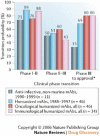Anti-infective monoclonal antibodies: perils and promise of development
- PMID: 16518372
- PMCID: PMC7097328
- DOI: 10.1038/nrd1987
Anti-infective monoclonal antibodies: perils and promise of development
Abstract
So far, most monoclonal antibodies have been developed for treating cancer or immunological diseases. However, the global spread of infections such as West Nile and corona viruses, and the need to address the potential threat of bioterrorism, has boosted public interest in, and government support of, counter-measures for infectious diseases. The attractive features of monoclonal antibodies, such as high specificity and effective recruitment of the immune system, would seem to make them excellent candidates as anti-infective agents. Here, we analyse trends in the development and approval of anti-infective monoclonal antibodies, and discuss factors that influence their success.
Conflict of interest statement
The authors declare no competing financial interests.
Figures
References
-
- Reichert JM. Therapeutic monoclonal antibodies: trends in development and approval in the US. Curr. Opin. Mol. Ther. 2002;4:110–118. - PubMed
Publication types
MeSH terms
Substances
LinkOut - more resources
Full Text Sources
Other Literature Sources


